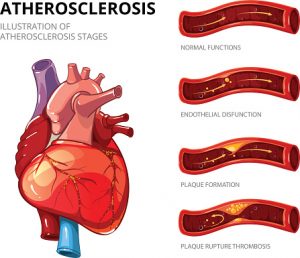 Systemic sclerosis – scleroderma – is an independent risk factor for atherosclerosis, which is hardening of the arteries. The findings come from researchers in Hong Kong who uncovered that scleroderma can contribute to atherosclerosis. Among the known risk factors for atherosclerosis are age and hypertension.
Systemic sclerosis – scleroderma – is an independent risk factor for atherosclerosis, which is hardening of the arteries. The findings come from researchers in Hong Kong who uncovered that scleroderma can contribute to atherosclerosis. Among the known risk factors for atherosclerosis are age and hypertension.
Scleroderma is a connective tissue disorder in which the tissue of the skin becomes hardened due to an increase in collagen. It is estimated that 49,000 Americans suffer from scleroderma. Research has revealed that scleroderma patients are often at a higher risk for coronary artery disease, the risk factors for which has long been unknown.
Advertisement
The research team, led by Dr. Mo Yin Mok, recruited 53 scleroderma patients and 106 healthy controls to examine coronary artery calcium scores and cardiovascular risk factors. Disease activity score, antiphospholipid antibodies, C-reactive protein, and erythrocyte sedimentation rate were also measured among scleroderma patients.
Upon analysis completion, researchers found that 57 percent of scleroderma patients had moderate to severe coronary calcification, compared to only 29 percent of the healthy controls. Scleroderma patients also had lower LDL cholesterol, HDL cholesterol, and diastolic blood pressure, compared to the controls. Furthermore, one-third of the group also had low body mass index compared to the controls, many of them being considered underweight among the Asian population.
Lastly, systemic sclerosis was found to be an independent risk factor for atherosclerosis. The longer a person has had scleroderma, the worse their atherosclerosis was.
Dr. Mok concluded, “Our findings show that systemic sclerosis patients have an 11-fold increased risk for developing moderate to severe coronary calcification after adjustment for normal cardiovascular risk factors. CAD is a major global health concern, and further studies should explore modifiable disease-specific risk factors in scleroderma patients that could inhibit coronary calcification in this population.”
Other risk factors for atherosclerosis
Although the exact cause of atherosclerosis is still unknown, there are many well-established risk factors that contribute to its onset. As you become aware of the risk factors for atherosclerosis, you can better prevent it from occurring to you by making lifestyle changes for the better.
Aside from scleroderma, the risk factors contributing to atherosclerosis are:
- Unhealthy cholesterol levels
- Hypertension – high blood pressure
- Smoking
- Insulin resistance and diabetes
- Obesity and excess weight
- Lack of physical activity
- Unhealthy diet, especially one high in trans fats, saturated fat, salt, and sugar
- Old age
- Family history of heart disease, especially if your father or brother was diagnosed with heart disease prior to the age of 55, or if your mother or sister was diagnosed prior to 65
Advertisement
There are other risk factors that the researchers are examining. For example, they have found that having high levels of C-reactive proteins (CRP) in the blood may increase a person’s risk for atherosclerosis and heart attack. Inflammation in the body can contribute to atherosclerosis, too. Low CRP levels and high triglyceride levels have also been found to play a role in atherosclerosis.
Sleep apnea, chronic stress, and alcohol consumption can all increase the risk of atherosclerosis. Thus, it’s important that you seek out treatment for sleep apnea, reduce stress, and monitor your alcohol intake to further reduce your risk, especially if you already have a family history of the condition.
By monitoring the controllable aspects, you can overcome age and family history as risk factors and reduce your risk of atherosclerosis.
